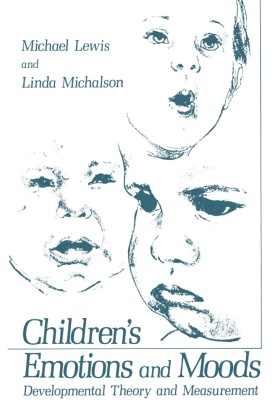Fr. 69.00
Michael Lewis, Linda Michalson, Michae Lewis, Michael Lewis
Children's Emotions and Moods - Developmental Theory and Measurement
Englisch · Taschenbuch
Versand in der Regel in 1 bis 2 Wochen (Titel wird auf Bestellung gedruckt)
Beschreibung
No one would deny the proposition that in order to understand human behavior and development, one must understand "feelings. " The in tere st in emotions is enduring. Yet, within the discipline of psychology, the study of feelings and emotions has been somewhat less than re spectable, a stepchild to the fields of cognitive science and psycho linguistics. PerusaI of the language acquisition literature reveals a greater concem among psychologists for the acquisition of prepositions than for terms that convey feelings. Without question, issues related to emo tion, its development, and its measurement have been neglected in the research literature until quite recently. From a developmental perspective, Piaget and his followers have articulated a complex theory of transition and change in intellectual behavior. Nearly a century ago, Freud proposed an elaborate theory of personality development in which some aspects of emotional growth were considered. We await the construction of a comprehensive theory of emotional development. Recognizing such a need, we set out over a decade ago to solve what seemed to be a relatively simple problem: By observing young children, could one successfully classify children in terms of individual differences on emotional dimensions such as happiness, fear, and anger? The task appeared easy. One could send graduate students into a preschool and ask them to observe children for several days, after which th ey would rank the children in terms of differences on various emo tional dimensions.
Inhaltsverzeichnis
1. Why Study Emotion?.- Why Not Study Cognition?.- 2. Emotion: An Overview.- What is Emotion?.- Emotion versus Affect.- Primary versus Secondary or Derived Emotions.- Emotion, Mood, and Personality.- Individual Differences in Emotion.- 3. Approaches to the Study of Emotion.- Philosophical Inquiries into Emotion.- The Physiological Approach.- The Cognitive Approach.- The Motivational Approach.- The Cognitive-Emotional Eugue.- 4. The Structure of Emotion: The Development of Five Components.- Emotional EJicitors.- Emotional Receptors.- Emotional States.- Emotional Expressions.- Emotional Experiences.- 5. The Development of Emotion.- A Model of Emotion.- Specific Developmental Issues.- 6. The Socialization of Emotion: How and When to Express Emotions.- Issues in the Socialization of Emotion.- How to Express Emotions: The Use of Display Rules.- When to Express Emotions: Knowledge of Emotions by Situation.- 7. The Socialization of Emotion: How Emotions Are Managed, Labeled, and Interpreted.- How Emotions Are Managed: The Use of Others.- How Emotions Are Labeled: The Acquisition of an Affect Lexicon.- How Emotions Are Interpreted.- 8. The Measurement of Emotion.- Emotions as Private Acts.- The Meaning of Behavior.- Stimulus or Contextual Meaning.- 9. Construction of the Scales of Socioemotional Development.- Which Emotions Should Be Studied?.- Where Should Emotions Be Studied?.- Which Situations Should Be Used?.- Which Behaviors Should Be Used?.- The Scales of Socioemotional Development.- 10. Internal Properties of the Scales.- Method.- Internal Consistency of the Domain Scales.- Independence of the Domain Scales.- 11. Individual Differences in Emotional States.- Age and Gender Differences.- Social Milieu Differences.- Relationships among Emotional States.- Patterns of Emotional States.- 12. Profiles of Enduring Emotional States (Moods).- Constructing Individual Profiles.- Case Studies.- Concluding Remarks.- References.- Appendix A. Scales of Socioemotional Development.- Appendix B. Coding Forms for the Scales of Socioemotional Development.- Author Index.
Über den Autor / die Autorin
Michael Lewis, Jahrgang 1960, ist Wirtschaftsjournalist Autor von zahlreichen Sachbüchern. Er hat Abschlüsse von der Princeton University und der London School of Economics. Seine Erfahrungen als Investmentbanker verarbeitete er 1989 in seinem ersten Buch. Zahlreiche weitere Bestseller aus der Finanzszene und der Welt des Sports folgten. Lewis lebt mit seiner Frau und seinen drei Kindern in Berkeley, Kalifornien.
Produktdetails
| Autoren | Michael Lewis, Linda Michalson |
| Mitarbeit | Michae Lewis (Herausgeber), Michael Lewis (Herausgeber) |
| Verlag | Springer, Berlin |
| Sprache | Englisch |
| Produktform | Taschenbuch |
| Erschienen | 17.10.2013 |
| EAN | 9781461336228 |
| ISBN | 978-1-4613-3622-8 |
| Seiten | 472 |
| Illustration | XVI, 472 p. |
| Thema |
Geisteswissenschaften, Kunst, Musik
> Psychologie
> Theoretische Psychologie
|
Kundenrezensionen
Zu diesem Artikel wurden noch keine Rezensionen verfasst. Schreibe die erste Bewertung und sei anderen Benutzern bei der Kaufentscheidung behilflich.
Schreibe eine Rezension
Top oder Flop? Schreibe deine eigene Rezension.

